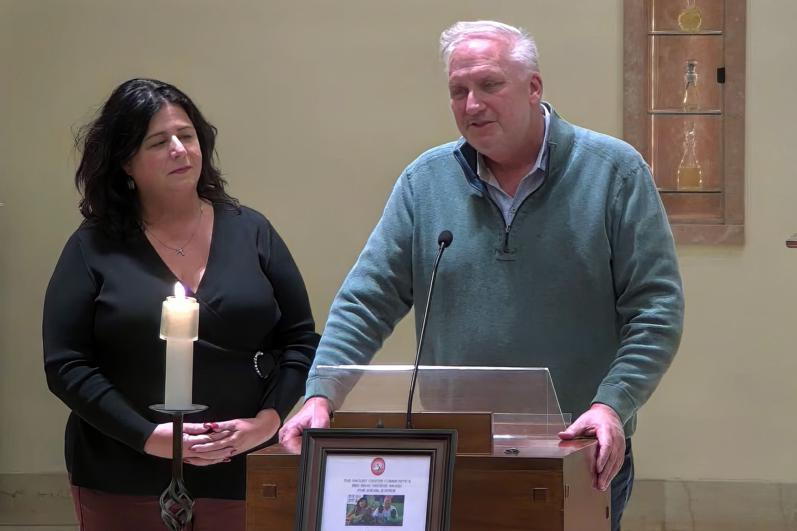Paulist Center honors Len and Cherylann Gengel, founders of Be Like Brit Foundation
BRAINTREE -- In January 2010, 19-year-old Worcester native Britney Gengel went on a humanitarian trip with her college to help orphanages in Haiti. While on the trip, she texted her parents, Len and Cherylann Gengel, to say that she loved Haiti and wanted to start her own orphanage there.
Three hours later, Britney Gengel, three of her classmates, two professors, and hundreds of thousands of others would perish in the devastating Haiti earthquake.
Looking back, Len Gengel believes that his daughter's text message was a gift from God. He and Cherylann used their life savings to make Britney's final wish come true. They founded the Be Like Brit Foundation, which runs an orphanage and school for 66 children in the Haitian town of Grand-Goave.
For their work, Len and Cherylann Gengel received the Isaac Hecker Award for Social Justice from the Paulist Center of Boston on Nov. 18.
"They trusted God in their quest to find meaning and purpose in tragedy," Susan Rutkowski, Paulist Center pastoral minister of religious education and social justice, said of the Gengels at the award presentation.
The award is named after Father Isaac Hecker, the founder of the Paulist Fathers, who was dedicated to serving those on the margins of society.
Rutkowski said that like Father Hecker, the Gengels sought out the most vulnerable in order to fulfill their spiritual calling. She noted that Britney Gengel served the people of Haiti "with her heart full of love, a spirit of energy and service, and an unwavering faith in God" and that her family decided to do the same in honor of her.
The Be Like Brit Foundation has 100 staff members. Throughout its history, 1,800 "Britsionaries" have come to Haiti to work at the orphanage, build houses, and provide medical care to the people of Grand-Goave.
"In their willingness to travel to Haiti and help complete strangers," Rutkowski said, "they have truly embodied what it means to 'Be Like Brit.'"
The Brit's Home orphanage is 19,000 square feet in area, in honor of Britney Gengel's 19 years of life. It is shaped like the letter B, and has six missionary rooms, in honor of the four students and two professors who died in the earthquake. The building survived a 7.2-magnitude earthquake in 2021.
As she and her husband gave their remarks, Cherylann Gengel was wearing the necklace that she gave her daughter upon her confirmation. She was wearing it when she died in the earthquake.
"She really was a voice for those who didn't have one," she said about her daughter. "She really had a passion for people, and she wanted to help people, and that's why she went to Haiti."
When the Gengel family was torn apart by grief, Britney Gengel's final text message was what inspired them to "get up the next day and the day after."
"That text message is why we do what we do," Cherylann Gengel said.
She thanked "the thousands of people around the world" who helped the foundation over the years.
In his remarks, Len Gengel said that he believed the foundation is "God's work."
"We always treasure and honor our daughter by keeping her spirit alive and raising the next generation of leaders," he said.
The organization has "faced many challenges" in recent years. Following the assassination of Haitian President Jovenel Moise in 2021, violent gangs have become the de facto rulers of the country. Hunger and poverty are widespread.
"The only thing I can call it is anarchy," Len Gengel said.
Even amid such turmoil, he refuses to give up on the country that has become a second home to him.
"I love it," he said. "Haiti gets under your fingernails. It's an amazing, beautiful country."
Most NGOs left Haiti in the aftermath of the 2010 earthquake, but the Be Like Brit Foundation is determined to stick around.
"We're very proud of the fact that our commitment is everlasting," Len Gengel said.
Earlier this year, the Paulist Center gave the Hecker Award to Sister Norma Pimentel, a Missionary of Jesus renowned for her advocacy for the humane treatment of migrants at the U.S.-Mexico border.


















